According to common stereotypes and pretty much every Hollywood high school film ever, girls breed cliquishness. They rally a posse around them like the Pied Piper. They whisper secrets in geometry class and make burn books about your weird eyebrows, casting a complex web of exclusion and division across the cafeteria. Dudes, meanwhile, are chill. They’re above such pettiness.
Except apparently that’s all wrong. According to a new study by London School of Hygiene & Tropical Medicine, boys are actually more cliquey than girls.
Interestingly, the ins and out of dramatic high school friendships wasn’t actually the study’s primary focus. The boffins at London School of Hygiene & Tropical Medicine were initially attempting to figure out how infections spread around schools — “a hotbed for disease,” according Dr Clare Wenham, one of the report’s authors. So they documented how many people students would most commonly come in contact with, asking 460 Year 7 pupils to name the six people they hung out with the most, every day, for six months. To make sure they had a cross section of students, they focused on four schools with different socioeconomic backgrounds.
The findings? Boys tended to hang out with the same small group of people, while girls had “bigger, looser friendship groups”.
Essentially, this defies the stereotype that girls hang out in little cliques of mean girls. That actually, female friendship is malleable, it can traverse boundaries and cafeteria tables. Which is refreshing: so often female friendships are portrayed in popular culture as toxic and insular, when really they can be nuanced and diverse.
That said — it’s not always plain sailing. The BBC reports psychologist Dr Terri Apte saying, “It has been observed that boys’ friendships are more stable and girls’ are more volatile. As a result, girls might feel more pressure to have ‘just in case’ friends, in case they fall out with their best friend and they feel more social pressure to be friendly with people that aren’t really their friends than boys.”
Yet while ‘volatile’ doesn’t exactly sound like a wholly positive descriptor, having multiple friends in various circles isn’t always a bad thing. Different friends can serve different purposes, can be there for you in different times. In contrast, having a singular clique can be claustrophobic when you’re in it, and crushing when you’re left out. Maybe it’s time to rewrite the stereotypes.
Read more:

